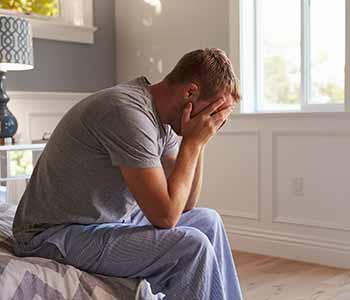Woodstock patients ask, “What can cause urinary incontinence?”
Do you find yourself running to the bathroom? Do you avoid social situations out of fear of leaking urine? If you are one of the 13 million patients in the United States who experiences incontinence, you have asked, “What can cause urinary incontinence?” With offices in Park City, Lake Forest, and Woodstock, IL, Chicago area women can turn to Dr. Sanjay Gandhi of Partners in Pelvic Health North Shore Urogynecology for top quality feminine care.

Although incontinence occurs in men and women, women are twice as likely to experience it. This is due to the structure of the female urinary tract and physical changes women experience such as pregnancy, childbirth, and menopause. Urinary incontinence often starts with subtle symptoms that gradually and slowly become worse.
Types of incontinence
There are different types of incontinence. The symptoms may be similar but the underlying causes may differ.
- Stress incontinence
- Urge incontinence
- Less common forms include overflow incontinence, total incontinence, functional incontinence, and anatomical incontinence
Stress urinary incontinence affects approximately 8 million women in the United States. Urinary incontinence involves the unintentional loss of urine. Stress incontinence occurs when specific physical movements such as coughing, sneezing, running, or heavy lifting place stress on the bladder leading to accidental urine loss. Stress incontinence is more common in women than in men. Patients who experience urinary incontinence are often embarrassed and may limit their outside personal and professional activities.
Urge incontinence has also been called overactive or spastic bladder. This condition involves the involuntary loss of urine that often occurs when a person has a strong, sudden need to urinate. It is not a disease but is a sign of an underlying health issue.
Causes or contributing factors of urinary incontinence
 As the bladder fills with urine, it expands. Normally, valve-like muscles stay closed to prevent leakage. When the muscles and tissues that support the bladder and the muscles that regulate urine release weaken, stress incontinence occurs. This can lead to frequent urination as patients try to continually empty their bladders to avoid involuntary leakage.
As the bladder fills with urine, it expands. Normally, valve-like muscles stay closed to prevent leakage. When the muscles and tissues that support the bladder and the muscles that regulate urine release weaken, stress incontinence occurs. This can lead to frequent urination as patients try to continually empty their bladders to avoid involuntary leakage.
Urge incontinence is caused by involuntary contractions of the bladder muscle. The muscles that support your bladder and regulate urine may lose strength. This pushes urine out of the bladder resulting in leakage or a rush for the bathroom. Having an overactive bladder is a type of urge incontinence even though this may not involve leaking urine. The cause of these involuntary muscle contractions is often unknown. For patients with urge incontinence, possible causes may include bladder irritation, emotional stress, or brain conditions such as Parkinson’s disease or a stroke. Smoking, years of high impact physical activity, or previous pelvic surgery can put patients at a higher risk or contribute to the condition.
For some patients, it is a single experience or condition that causes urinary incontinence. For others, multiple experiences combine to increase a patient’s risk of the condition. Physical conditions or experiences that raise a patient’s risk of incontinence include:
- Pregnancy
- Vaginal childbirth
- Multiple births
- Hysterectomy
- Obesity or overweight
- Older age
- Bladder stones
- Abnormalities in the urinary tract
- Bladder blockage
- Chronic bladder infections
Additionally, certain diseases or conditions have been linked to or raise the risk of incontinence. These diseases include:
- Chronic cough due to bronchitis or smoking
- Pelvic organ prolapse
- Diabetes
- Parkinson’s
- Alzheimer’s
- Multiple sclerosis
- Bladder cancer
- Stroke
- Spinal cord injury
Any activity that places pressure on the bladder increases the risk of urine leakage especially if the bladder is full. Although it may not happen with all physical activities, patients who experience stress incontinence may experience urine loss when coughing, sneezing, laughing, lifting heavy objects, exercising, or having sex.
 There are medicines and foods that have been known to worsen incontinence symptoms. Caffeinated and carbonated drinks often increase the need to urinate. Medications such as diuretics or antidepressants can increase urine production or relax the bladder. Smoking can also make incontinence worse.
There are medicines and foods that have been known to worsen incontinence symptoms. Caffeinated and carbonated drinks often increase the need to urinate. Medications such as diuretics or antidepressants can increase urine production or relax the bladder. Smoking can also make incontinence worse.
If you are noticing signs or symptoms of incontinence, don’t hesitate to ask your doctor what can cause urinary incontinence or how to treat it. Once symptoms interfere with your daily activities, professional help is needed. To experience the best urogynecological care, contact Partners in Pelvic Health North Shore Urogynecology to schedule your appointment with Dr. Sanjay Gandhi. Call (844) 327-1188.
Back to Incontinence Page






